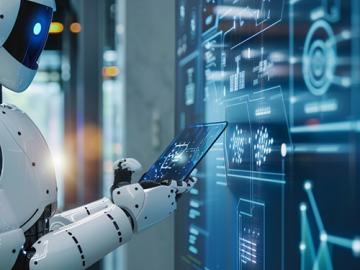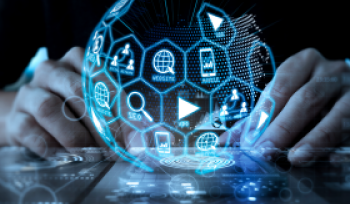The Intersection of AI and Human Potential
Today, AI has the potential to take the concept of teamwork to an entirely new level. By acting as a powerful collaborator, AI can amplify the capabilities of individuals, making each person more like a team of experts. This transformation means that within every human team, there is now an AI-enhanced human team, combining the best of human creativity and intuition with the computational power and data-processing abilities of AI.
Boosting Productivity and Efficiency
Time management and efficiency are often cited as crucial ingredients for success. AI tools are helping us manage our time more effectively by automating routine tasks and optimizing workflows, allowing professionals to focus on more strategic activities.
Platforms such as Akabot.com allows users to automate mundane tasks while AI-driven scheduling assistants like TimeHero and CoSchedule coordinate meetings, prioritize tasks, and send reminders.
Project management software like Clickup uses AI to allocate resources, track progress, and predict potential bottlenecks.
AI's ability to learn and adapt to individual preferences means that these tools can become increasingly personalized over time, tailoring solutions to the unique needs of each user.
AI in Decision-Making: Enhancing Business Strategies
AI analytics and predictive modeling are transforming decision-making processes in business, from operational decisions to strategic planning. By analyzing historical data and identifying trends, AI can provide valuable insights that inform business strategies. For example, AI can predict market shifts, customer behavior, and competitive dynamics, helping companies to stay ahead of the curve and make proactive decisions.
Interested in harnessing AI for your business strategy? Check out our AI for Executives program.
Furthermore, AI-powered decision-making tools can simulate scenarios, allowing businesses to assess potential outcomes before committing to a course of action. This capability is particularly valuable in strategic planning, where understanding the potential impact of different decisions can significantly reduce risk. By integrating AI into their decision-making processes, businesses can achieve greater accuracy, agility, and confidence in their strategies.
AI in Health and Self-Care
AI applications in personal health monitoring, mental wellness apps, and lifestyle management are transforming how individuals approach health and self-care.
Wearable devices equipped with AI can track vital signs, monitor physical activity, and even detect early signs of illness, providing users with real-time feedback on their health.
Mental wellness apps powered by AI are also gaining popularity, offering personalized support and guidance to users. These apps can analyze user inputs to provide tailored recommendations for managing stress, improving sleep, and enhancing overall well-being.
By leveraging AI, individuals can take a more proactive approach to their health and self-care, ensuring that they stay on top of their physical and mental well-being.
AI-Powered Learning and Skills Training
From virtual tutors to interactive simulations, AI is making learning more personal, engaging, and accessible than ever before.
For example, by analyzing an individual's learning style, strengths, and weaknesses, AI-powered tools can create customized training programs that optimize the learning experience for each learner. They can also provide real-time feedback and support, helping students to overcome challenges and stay motivated.
This personalized approach ensures that learners receive the most relevant and effective content, accelerating their skill development and career growth.
As the demand for continuous learning and upskilling grows, AI will play an increasingly important role in helping professionals stay competitive in the evolving job market.
The AI Talent Landscape: Building and Leading AI-Ready Teams
So, how can leaders fully leverage AI for team and business success? First, it requires building AI-ready teams. Organizations need to hire individuals with the right technical skills and an understanding of AI's potential applications. However, hiring is just the beginning.
Upskilling existing teams and fostering a culture of continuous learning are equally important for ensuring that the workforce can adapt with AI advancements. By investing in AI education and training programs, organizations can equip their employees with the skills needed to leverage AI effectively.
Additionally, leaders must prioritize creating an environment that encourages innovation and collaboration, where team members feel empowered to explore new ideas and technologies.
Cultivating an AI-savvy workforce not only enhances organizational performance but also positions companies to capitalize on the opportunities presented by AI-driven innovation.
More Tools to Diagnose Team Health.
The Future of Performance Optimization
As we move into the future, we will continue to use AI to boost performance. Individuals will continue to enhance their productivity and well-being, teams will further streamline their workflows and collaboration, and businesses will make more informed and strategic decisions.
As AI advances, its potential to optimize various aspects of our lives will only expand, driving significant improvements in efficiency, creativity, and growth, ultimately improving our ability (as individuals and teams) to achieve our loftiest goals and aspirations.
REFERENCES
- Artificial Intelligence and the Future of Humans: https://www.pewresearch.org/internet/2018/12/10/artificial-intelligence-and-the-future-of-humans/
- Think Again: How AI Unlocks Human Potential: https://www.gartner.com/en/experts/think-again-series/ai-unlocks-human-potential
- Building an AI-Ready Team: How to Prepare Your People for AI?: https://www.boldare.com/blog/how-to-build-an-ai-ready-team/
Dive Deeper
Take a deep-dive into this topic and gain expert, working knowledge by joining us for the program that inspired it!
AI for Executives Program
Leverage AI's transformative power and acquire the strategic frameworks your company needs to thrive in a radically changing environment.
Learn moreAI for Healthcare
Learn how AI is a catalyst for unprecedented outcomes in the healthcare sector. Taught by UC Berkeley faculty and offered in person.
Learn more


